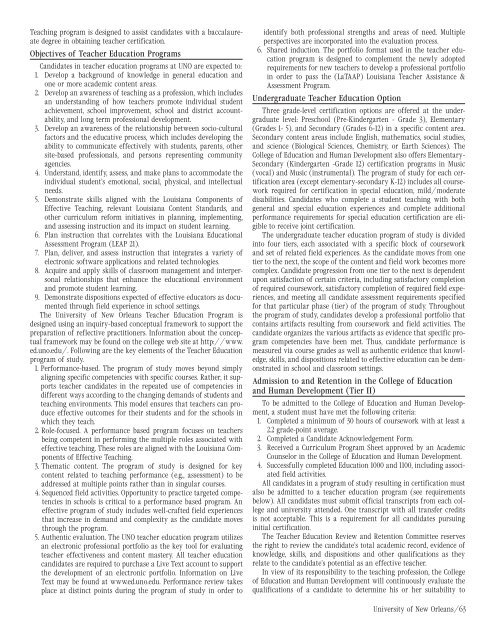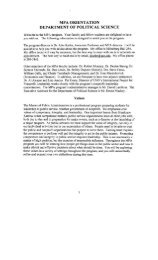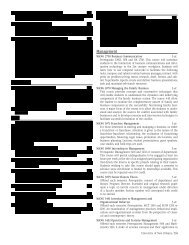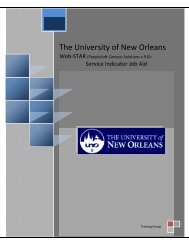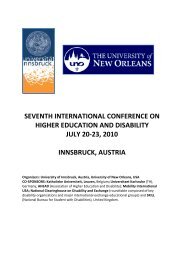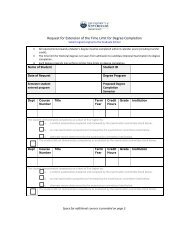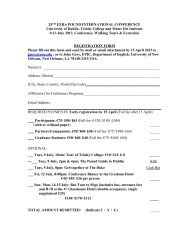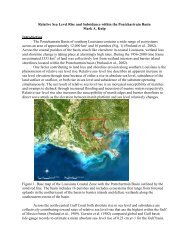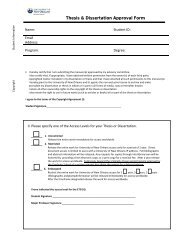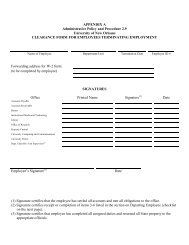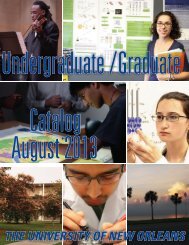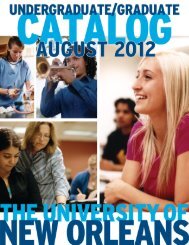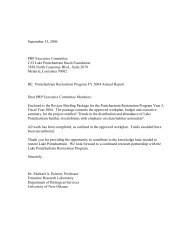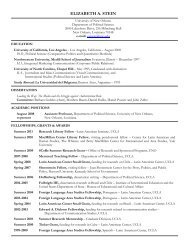Untitled - University of New Orleans
Untitled - University of New Orleans
Untitled - University of New Orleans
You also want an ePaper? Increase the reach of your titles
YUMPU automatically turns print PDFs into web optimized ePapers that Google loves.
Teaching program is designed to assist candidates with a baccalaureate<br />
degree in obtaining teacher certification.<br />
Objectives <strong>of</strong> Teacher Education Programs<br />
Candidates in teacher education programs at UNO are expected to:<br />
1. Develop a background <strong>of</strong> knowledge in general education and<br />
one or more academic content areas.<br />
2. Develop an awareness <strong>of</strong> teaching as a pr<strong>of</strong>ession, which includes<br />
an understanding <strong>of</strong> how teachers promote individual student<br />
achievement, school improvement, school and district accountability,<br />
and long term pr<strong>of</strong>essional development.<br />
3. Develop an awareness <strong>of</strong> the relationship between socio-cultural<br />
factors and the educative process, which includes developing the<br />
ability to communicate effectively with students, parents, other<br />
site-based pr<strong>of</strong>essionals, and persons representing community<br />
agencies.<br />
4. Understand, identify, assess, and make plans to accommodate the<br />
individual student’s emotional, social, physical, and intellectual<br />
needs.<br />
5. Demonstrate skills aligned with the Louisiana Components <strong>of</strong><br />
Effective Teaching, relevant Louisiana Content Standards, and<br />
other curriculum reform initiatives in planning, implementing,<br />
and assessing instruction and its impact on student learning.<br />
6. Plan instruction that correlates with the Louisiana Educational<br />
Assessment Program (LEAP 21).<br />
7. Plan, deliver, and assess instruction that integrates a variety <strong>of</strong><br />
electronic s<strong>of</strong>tware applications and related technologies.<br />
8. Acquire and apply skills <strong>of</strong> classroom management and interpersonal<br />
relationships that enhance the educational environment<br />
and promote student learning.<br />
9. Demonstrate dispositions expected <strong>of</strong> effective educators as documented<br />
through field experience in school settings.<br />
The <strong>University</strong> <strong>of</strong> <strong>New</strong> <strong>Orleans</strong> Teacher Education Program is<br />
designed using an inquiry-based conceptual framework to support the<br />
preparation <strong>of</strong> reflective practitioners. Information about the conceptual<br />
framework may be found on the college web site at http://www.<br />
ed.uno.edu/. Following are the key elements <strong>of</strong> the Teacher Education<br />
program <strong>of</strong> study.<br />
1. Performance-based. The program <strong>of</strong> study moves beyond simply<br />
aligning specific competencies with specific courses. Rather, it supports<br />
teacher candidates in the repeated use <strong>of</strong> competencies in<br />
different ways according to the changing demands <strong>of</strong> students and<br />
teaching environments. This model ensures that teachers can produce<br />
effective outcomes for their students and for the schools in<br />
which they teach.<br />
2. Role-focused. A performance based program focuses on teachers<br />
being competent in performing the multiple roles associated with<br />
effective teaching. These roles are aligned with the Louisiana Components<br />
<strong>of</strong> Effective Teaching.<br />
3. Thematic content. The program <strong>of</strong> study is designed for key<br />
content related to teaching performance (e.g., assessment) to be<br />
addressed at multiple points rather than in singular courses.<br />
4. Sequenced field activities. Opportunity to practice targeted competencies<br />
in schools is critical to a performance based program. An<br />
effective program <strong>of</strong> study includes well-crafted field experiences<br />
that increase in demand and complexity as the candidate moves<br />
through the program.<br />
5. Authentic evaluation. The UNO teacher education program utilizes<br />
an electronic pr<strong>of</strong>essional portfolio as the key tool for evaluating<br />
teacher effectiveness and content mastery. All teacher education<br />
candidates are required to purchase a Live Text account to support<br />
the development <strong>of</strong> an electronic portfolio. Information on Live<br />
Text may be found at www.ed.uno.edu. Performance review takes<br />
place at distinct points during the program <strong>of</strong> study in order to<br />
identify both pr<strong>of</strong>essional strengths and areas <strong>of</strong> need. Multiple<br />
perspectives are incorporated into the evaluation process.<br />
6. Shared induction. The portfolio format used in the teacher education<br />
program is designed to complement the newly adopted<br />
requirements for new teachers to develop a pr<strong>of</strong>essional portfolio<br />
in order to pass the (LaTAAP) Louisiana Teacher Assistance &<br />
Assessment Program.<br />
Undergraduate Teacher Education Option<br />
Three grade-level certification options are <strong>of</strong>fered at the undergraduate<br />
level: Preschool (Pre-Kindergarten - Grade 3), Elementary<br />
(Grades 1- 5), and Secondary (Grades 6-12) in a specific content area.<br />
Secondary content areas include: English, mathematics, social studies,<br />
and science (Biological Sciences, Chemistry, or Earth Sciences). The<br />
College <strong>of</strong> Education and Human Development also <strong>of</strong>fers Elementary-<br />
Secondary (Kindergarten -Grade 12) certification programs in Music<br />
(vocal) and Music (instrumental). The program <strong>of</strong> study for each certification<br />
area (except elementary-secondary K-12) includes all coursework<br />
required for certification in special education, mild/moderate<br />
disabilities. Candidates who complete a student teaching with both<br />
general and special education experiences and complete additional<br />
performance requirements for special education certification are eligible<br />
to receive joint certification.<br />
The undergraduate teacher education program <strong>of</strong> study is divided<br />
into four tiers, each associated with a specific block <strong>of</strong> coursework<br />
and set <strong>of</strong> related field experiences. As the candidate moves from one<br />
tier to the next, the scope <strong>of</strong> the content and field work becomes more<br />
complex. Candidate progression from one tier to the next is dependent<br />
upon satisfaction <strong>of</strong> certain criteria, including satisfactory completion<br />
<strong>of</strong> required coursework, satisfactory completion <strong>of</strong> required field experiences,<br />
and meeting all candidate assessment requirements specified<br />
for that particular phase (tier) <strong>of</strong> the program <strong>of</strong> study. Throughout<br />
the program <strong>of</strong> study, candidates develop a pr<strong>of</strong>essional portfolio that<br />
contains artifacts resulting from coursework and field activities. The<br />
candidate organizes the various artifacts as evidence that specific program<br />
competencies have been met. Thus, candidate performance is<br />
measured via course grades as well as authentic evidence that knowledge,<br />
skills, and dispositions related to effective education can be demonstrated<br />
in school and classroom settings.<br />
Admission to and Retention in the College <strong>of</strong> Education<br />
and Human Development (Tier II)<br />
To be admitted to the College <strong>of</strong> Education and Human Development,<br />
a student must have met the following criteria:<br />
1. Completed a minimum <strong>of</strong> 30 hours <strong>of</strong> coursework with at least a<br />
2.2 grade-point average.<br />
2. Completed a Candidate Acknowledgement Form.<br />
3. Received a Curriculum Program Sheet approved by an Academic<br />
Counselor in the College <strong>of</strong> Education and Human Development.<br />
4. Successfully completed Education 1000 and 1100, including associated<br />
field activities.<br />
All candidates in a program <strong>of</strong> study resulting in certification must<br />
also be admitted to a teacher education program (see requirements<br />
below). All candidates must submit <strong>of</strong>ficial transcripts from each college<br />
and university attended. One transcript with all transfer credits<br />
is not acceptable. This is a requirement for all candidates pursuing<br />
initial certification.<br />
The Teacher Education Review and Retention Committee reserves<br />
the right to review the candidate’s total academic record, evidence <strong>of</strong><br />
knowledge, skills, and dispositions and other qualifications as they<br />
relate to the candidate’s potential as an effective teacher.<br />
In view <strong>of</strong> its responsibility to the teaching pr<strong>of</strong>ession, the College<br />
<strong>of</strong> Education and Human Development will continuously evaluate the<br />
qualifications <strong>of</strong> a candidate to determine his or her suitability to<br />
<strong>University</strong> <strong>of</strong> <strong>New</strong> <strong>Orleans</strong>/63


